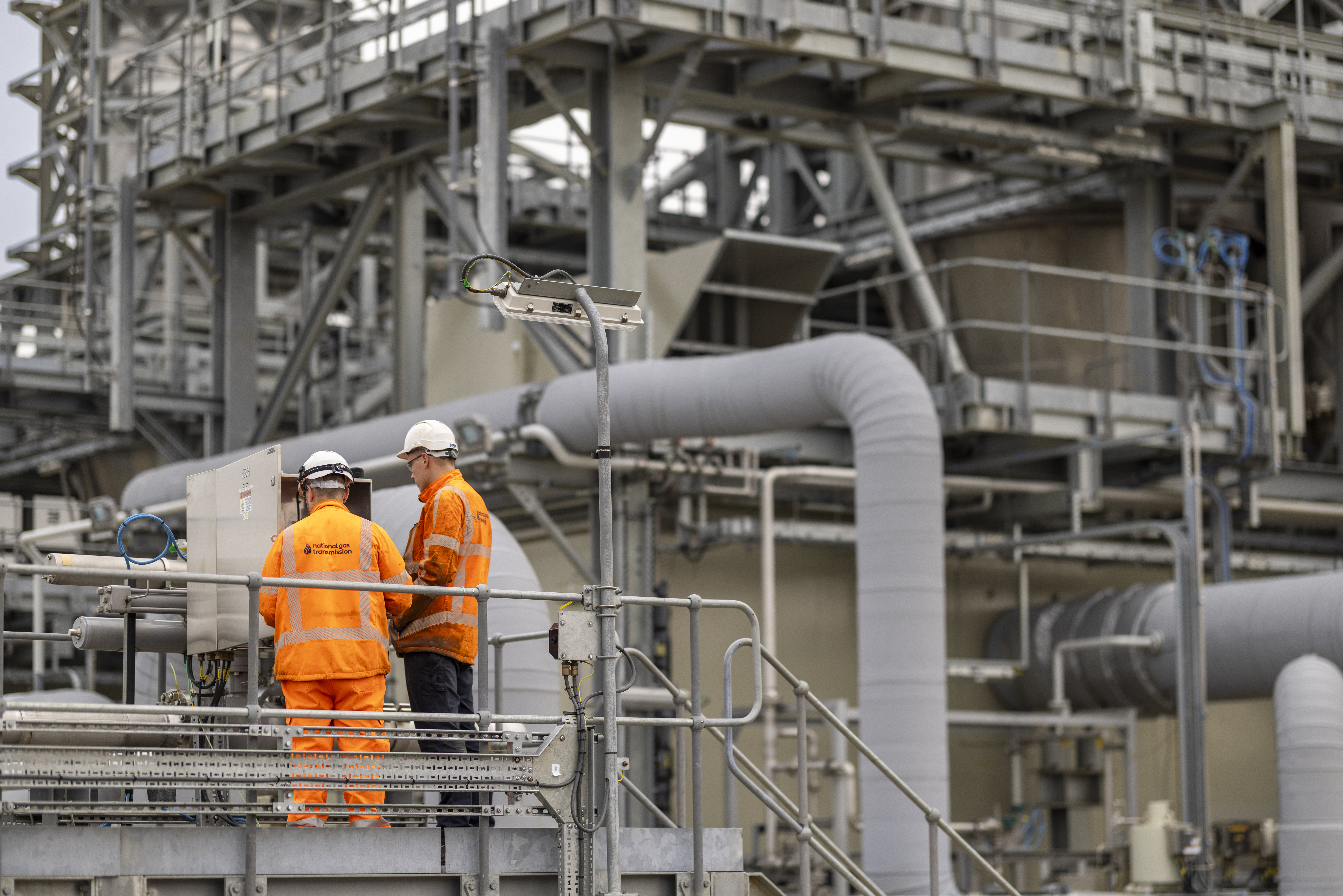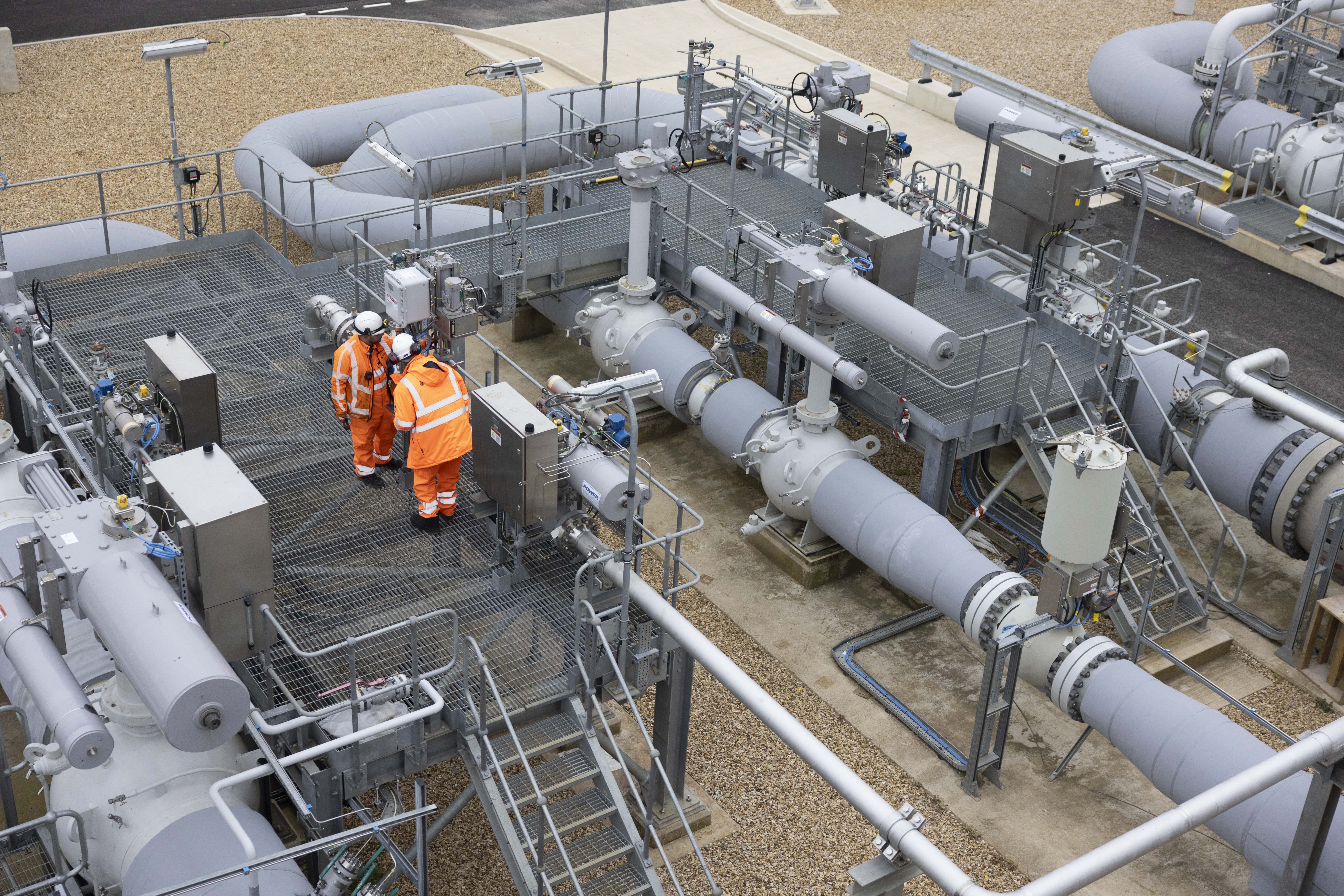National Gas in the UK energy sector

As the owner and operator of Critical National Infrastructure – our National Transmission System (NTS) – National Gas has a key role to play in maintaining energy security for Great Britain and developing clean energy solutions to support the transition to net zero for current and future energy consumers.
That means we need to work closely with government, regulators (including Ofgem), national advisory bodies and the National Energy System Operator (NESO) to ensure we deliver safe, reliable energy across the country, while developing sustainable energy systems for the future.
Who do we work with?
We take an active role in working collaboratively with organisations and departments across government and industry to ensure we fulfil national objectives and continue to deliver energy safely across the country for energy consumers. We engage in policy development with the government and have a regulatory team which looks at the current and future regulatory environment for natural gas, hydrogen and carbon dioxide. We also have colleagues in public policy who respond to government initiatives and announcements and meet with officials and politicians – ensuring we support their objectives for Great Britain’s energy system, today and in the future.
The key energy sector stakeholders we work with include:
Government
Department for Energy Security and Net Zero (DESNZ)
We have regular interactions with DESNZ, from the Secretary of State through to civil servants at all levels. We work closely with the department on energy security and net zero, which means we focus particularly on:
- Resilient natural gas supply: our first priority is security of energy supply for the nation and beyond. We must maintain a reliable supply of natural gas via the National Transmission System (NTS) as the backbone of the UK energy system, requiring operational excellence and resilient infrastructure. Our CEO, Jon Butterworth, is the Network Emergency Co-ordinator (NEC) responsible for managing the gas industry response to a gas supply emergency.
- The future of hydrogen: the requirement for a core hydrogen network (as recommended by the NIC) and the potential role of National Gas as system operator for this hydrogen network. Through Project Union, we are repurposing existing gas transmission pipelines to create a core hydrogen network for power generation, industry, transport and storage. Our CEO, Jon Butterworth, sits on the Hydrogen Delivery Council (chaired by Sarah Jones MP, Minister for Industry), which informs and advances the development of hydrogen as a strategic decarbonised energy carrier for the UK.
- Transmission blending: we work with DESNZ and the Health and Safety Executive (HSE) on blending hydrogen with natural gas in the transmission network – sharing insights from our FutureGrid programme to help develop a hydrogen economy for industry and power generation.
- Carbon Capture and Storage (CCS): the role of National Gas as an onshore transporter of carbon dioxide captured from industrial facilities and power stations to advance industrial decarbonisation, including our work in the Scottish Cluster.
Secretary of State for Energy Security and Net Zero, Ed Millband, has appointed Chris Stark to lead a new Mission Control to deliver Clean Power by 2030. National Gas is now engaging with officials to break down barriers and accelerate progress towards net zero.
At a government level, we also engage with:
- The Treasury: on our current economic model for natural gas, as regulated by Ofgem, as well as hydrogen developments, Project Union and carbon capture.
- Cabinet Office: on economic security and resilience, as an operator of Critical National Infrastructure, and on security of energy supply.
- No10: on security of supply and overall energy policy strategy.
- DEFRA: on improving and protecting the environment, including climate adaptation and resilience. We also work closely with the Environment Agency in England, as an executive non-departmental public body within the remit of DEFRA, and the other environmental regulators of the devolved administrations in Scotland and Wales on matters relating to the permits to operate issued by those agencies.
Emergency planning
As part of our role as an operator of Critical National Infrastructure, we carry out emergency planning exercises to ensure the country is well prepared in the unlikely event of a gas shortage. These far-reaching exercises involve collaboration with multiple stakeholders, including DESNZ, Ofgem, NESO, FEN, ENA and the Gas Distribution Networks (GDNs). It’s another example of our collaborative relationship with government, regulators and the gas industry to ensure the safety and resilience of the gas network.
Regulators
Ofgem
National Gas is regulated by the energy regulator, Ofgem – the Office of Gas and Electricity Markets. Ofgem is a non-ministerial government department and an independent National Regulatory Authority.
The regulatory regime overseen by Ofgem applies to all aspects of the National Gas transmission business.The purpose of the regulatory regime is to simulate the effects of competition, so that we deliver outcomes that are in the interests of consumers.
National Gas has frequent engagements with Ofgem on a wide variety of issues, often working at a practical level on matters ranging from gas certification schemes to network resilience.
Health and Safety Executive (HSE)
The HSE is Britain’s national regulator for workplace health and safety. Its focus is on protecting people and places and helping everyone lead safer and healthier lives. We engage with the HSE on existing delivery across our gas transmission estate, and on the future of the gas network, including our innovation programmes on hydrogen, blending and carbon capture and storage.
Principally driven by the Gas Safety Management Regulations (GSMR) and Control of Major Accident Hazard Regulations (COMAH), we have regular topic-based intervention sessions with the HSE to ensure that we are delivering on expected requirements. Alongside these interventions there are bi-annual GSMR liaison meetings that review and consolidate our interactions and performance across the financial year. Additionally, National Gas interacts with the HSE on incidents and associated investigations.
Find out more about How we’re regulated.
National Energy System Operator (NESO)
National Energy System Operator (NESO)
NESO is the independent energy system planner and operator, created to help accelerate Great Britain’s energy transition. NESO is responsible for planning Great Britain’s electricity and gas networks, operating the electricity system, and making recommendations for the future of the whole energy system.
As National Gas is responsible for operating and maintaining the gas National Transmission System (NTS), NESO is a key partner in our work to develop the energy system for the future. We will support NESO in achieving the goals set out in its Clean Power 2030 Report.
Advisory bodies
National Infrastructure Commission (NIC) – carries out in-depth studies into the UK’s major infrastructure needs and makes recommendations to the government. Its work covers all sectors of economic infrastructure. National Gas feeds into regular infrastructure assessments carried out by the NIC, helping to inform government investments. A key infrastructure investment supported by the NIC is the core hydrogen network, which is required to connect sites of hydrogen demand, production and storage. The NIC is due to become NISTA in 2025, and we will continue to engage with NISTA.
- Climate Change Committee (CCC) – an independent, statutory body that advises government on emissions targets, reducing greenhouse gas emissions and preparing for and adapting to the impacts of climate change. We work closely with the CCC to inform and support the UK’s transition to net zero. The CCC has described Carbon Capture, Usage and Storage (CCUS) as a “necessity, not an option” for the transition to net zero, enabling the UK to deliver on its global climate commitments.
Trade bodies
Trade body memberships
National Gas plays an important role in advising, supporting and responding to government initiatives and announcements. As part of this work, we engage with trade and industry bodies in the UK and Europe. We are active members of:

